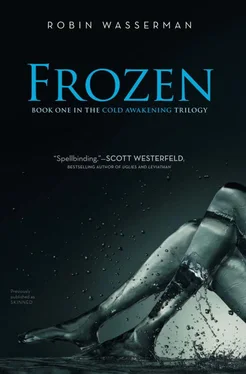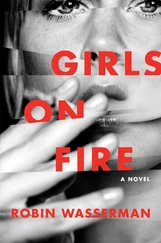Walker didn’t move. Not until she gave him a gentle push, digging her fists into the shallow concavity beneath his rib cage. He lurched across the room, and I felt frozen again, like I had that first day, locked inside the body.
Blink, I reminded myself. But when I shut the lids, I didn’t open them again.
He didn’t taste like anything. Nothing did anymore. His lips feathered across mine. I registered the touch, and then it was gone.
“Bye, Lia.”
I kept my eyes shut as his footsteps crossed the room. The door closed.
Bye.
“Survival of the fittest. And we were the fittest.”
It began Monday at six a.m., when the bed whispered me awake—or would have if an inner alert hadn’t already forced my eyes open and my brain back to full-scale conscious dread. It began as I picked through a stack of clothes in disgust, rejecting favorites—the mood dress useless, its temperature-activated swooshes and swirls requiring fluctuations in body temperature, which themselves required an actual body; the sonicsilk with its harmonic rippling just another reminder of the music I’d lost; the LBD, a linked-in black dress whose net-knit flared neon with every voice or text, too sensational; the soundproofed hoodie functional and cozy but not sensational enough, blah and gray, like I planned to fade into the background, scenery instead of the star—and finally being forced to resort to jeans and an old print-shirt that snatched random phrases from the network and scrolled them across the fabric. The look had been very hot, and then quickly very not, but it had settled into a neutral acceptability, and it was the best I could do.
It began—my official return to school and an officially normal life—with breakfast, another meal I could no longer eat. Or maybe with the sound of the car door slamming shut, Zo and me tucked inside, or with the hills giving way to a long, flat stretch of familiar green, the castle of brick and stone rising above the horizon.
In that old, normal life, it began after every break—whether two days or two months—with a squeal in stereo, Cass and Terra catching sight of me, fashionably late, pulling into the lot. It began with a rocket-launched embrace, arms locked, shoulders encircled, styles critiqued, stories spilled, all, it seemed, released in a single, shared breath. This time I had no stories, at least none I was willing to share. This time nothing was normal. But as the car pulled into the lot, I saw them bounce off the steps in front of the school. I opened the door and heard the squeal.
It begins now.
The first thing that registered were their clothes. Loose, ill-fitting, dull-colors, Cass in a T-shirt with a printed, unchanging slogan, Terra in jeans that sagged on her ass and a black shirt too loose and too worn, without any visible tech, like something you’d find in a city, or from one of those thrift zones Zo was always haunting for new retro rags.
The second thing: “Zo Zo!”
That was Cass’s squeal, Cass’s wide grin—and then she saw me, and both of them faded away.
She’d cut her black hair short and spiky, cropping it with a dusting of pink. “Lia?” Cass narrowed her eyes as if squinting would squeeze my features back to their familiar shape—or maybe block them out altogether. “Is that… you?”
“It’s me.” I didn’t dare try a smile. “In the flesh.”
No one laughed. Terra looked sick. She hip-bumped Zo.
“Zo Zo, why didn’t you tell us that your sister was coming back today?” she asked with a determined perk. “We would have… done something special. To celebrate.”
Terra’s hair was the same, but she was actually—it didn’t seem possible—wearing lipstick . And some kind of purple glitter above her eyes. Which didn’t make sense, because no one wore makeup anymore, except the wrinkled poor who couldn’t afford gen-tech or lift-tucks, and trashy retro slummers who thought it was cool to pretend they fit in to the first group. Oh, and seniles, who didn’t count, since they didn’t even know what year it was and so couldn’t be expected to remember that makeup had gone out with TVs and artificial preservatives. Why spend all that credit on the perfect face if any random could match the effect with a black marker and some pinkish paint? Zo was wearing lipstick too, of course, but that was nothing new.
“I asked, uh, Zo Zo” —I shot Zo a look. She ignored it—“not to say anything.” A lie. Like I could ever have imagined Zo talking to my friends. “Don’t blame her.”
“Doesn’t matter now,” Cass chirped. “You’re back!”
“Tell us everything,” Terra said. “Everything.”
“Zo Zo wouldn’t spill,” Cass said, thwapping Zo’s shoulder. “No matter how many times we asked. And, of course, someone has been totally zoned out forever.”
“Yeah…” I didn’t want to explain how I’d been lurking on the network in stealth mode, peeking over everyone’s shoulders, or why I hadn’t texted anyone back. Especially not with Zo—excuse me, Zo Zo —standing right there, listening to every word. “Sorry about that. I had a lot to, you know, deal with. For a while.”
“We can imagine,” Cass said.
“No, we can’t.” Terra sounded pissed. “Because we don’t know anything.”
“But we want to.” Cass touched my shoulder. “We do.”
Zo flicked a finger across her inner wrist, and the small screen she’d temp-adhered flashed twice. “Time, ladies.”
“Oh!” Cass blushed. “Right. We’re late. So, info dump later? Lunch?”
“Uh, sure—Wait, no, it’s Monday.” When it came to ruling the pack, lunch was key, but that was Tuesday through Friday. Mondays belonged to Walker. That had always been the deal, from the beginning.
“You and Walker ?” Terra asked. “You mean he didn’t—”
“Walker will deal,” Cass cut in.
He didn’t what? I thought. But didn’t ask.
“It’ll be fine,” Cass said. “Trust me. Lunch.”
“Lunch,” I agreed. Walker could wait. “But where are you going?”
“Too complicated.” Cass giggled as Terra tugged her away. “Later. Lunch.”
“Right. Later. Lunch.” I grabbed Zo before she could follow them. “So?”
She shook me off. “So what?”
“So since when do you steal my best friends?”
She smirked. “Maybe they stole me.”
“And where are you all going?”
“They’re your best friends. Shouldn’t you already know?”
“You know I haven’t talked to them in months,” I said.
“Exactly.”
“Zo!”
“I’m late.” She spun away, pausing only to shoot back the last word. “And at school it’s Zoie. Or Zo Zo.”
I was used to people watching me. I just wasn’t used to them gawking, then twisting away as soon as I caught them at it. The hallways were the worst. Conversation died as soon as I got close—sometimes tapering off, like a seeping wound that finally, as the heart stops pumping, runs out of blood, and sometimes cut off in its prime, a gunshot victim dropped by eight grams of lead. I knew the conversations that reached a violent, abrupt end were the ones about me, the machine roaming the halls claiming to be Lia Kahn. The other ones—the stumbling, mumbling trailings off into awkward silence—were just the result of nobody knowing what to say. That was at least better than the randoms who came up to me all day knowing exactly what to say, and this—no matter which words they used to disguise it—boiled down to “smile for the camera” as they aimed their ViMs at my face, zooming in for a close-up, pumping me for details they could post on their zone or a local stalker site and turn us both into fame whores.
Читать дальше












